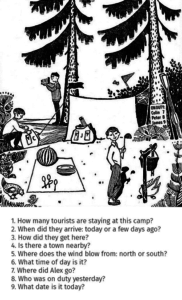This post is the third of a special “5 Teams Changing Career Education” series, featuring Q&A with the EdSim Challenge finalists. These solutions demonstrate the exciting potential for an ecosystem of next-generation simulations to strengthen in-demand career skills.
Our third post features a Q&A with Matt Anderson, Design Director at Octothorpe. His team developed The Irregular: A Mystery at Baker Street, a VR experience that uses critical thinking, problem solving, and teamwork to explore skills related to success in STEM fields.
What inspired you to create this educational VR/AR experience?
The concept of The Irregular came about when several of us had fun solving a visual puzzle over coffee that had been making the rounds on Facebook, which you can view below.

After we solved the puzzle, a rapid conversation followed about why digital games have somewhat abandoned the joy of using deductive reasoning. There’s something going on in this puzzle that is largely absent in even more traditional puzzle game genres, such as Point-and-Click, or even classic Text Adventures. The above puzzle creates a deep understanding of an obtuse situation through visual clues and contextual information. After extensive concepting, writing, scrapping, re-concepting, paper prototyping and technical exploration, we originated an interaction model that facilitated this type of experience. Shortly after, the vast potential for educational use became apparent.
How will your concept help students prepare for future careers?
The Irregular is actually a framework for episodic content addressing different components of the CTE Career Clusters per episode. Every Irregular experience will exercise employability skills, such as applied academic skills, critical thinking, interpersonal skills, information use, and systems thinking. Our first episodes will focus in STEM, as we believe STEM undergirds success in many of the career clusters. Each episode emphasizes learning-by-doing, so the technical and academic skills will be directly pertinent to the associated career. Our testing of the paper prototype has shown that students are motivated to complete the content when wrapped in an engaging mystery.
How do you see your solution evolving over the next six months to a year?
Our technology, interactions, and visuals are just getting stronger day by day, and our understanding of how to create fun, engaging methods for learning in VR is always expanding. We have four points of focus over the next six to twelve months: improve the teaching methods in the Irregular framework, generate a breadth of episodic content, ramp up the engagement through impressive visuals and fun interactions, and work with our advisory board on ways to most effectively demonstrate teaching efficacy and relate results in an effective way to the educators engaging with the software.
